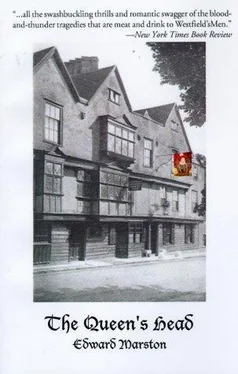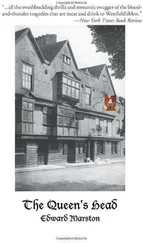Edward Marston - The Queens Head
Здесь есть возможность читать онлайн «Edward Marston - The Queens Head» весь текст электронной книги совершенно бесплатно (целиком полную версию без сокращений). В некоторых случаях можно слушать аудио, скачать через торрент в формате fb2 и присутствует краткое содержание. Жанр: Исторический детектив, на английском языке. Описание произведения, (предисловие) а так же отзывы посетителей доступны на портале библиотеки ЛибКат.
- Название:The Queens Head
- Автор:
- Жанр:
- Год:неизвестен
- ISBN:нет данных
- Рейтинг книги:5 / 5. Голосов: 1
-
Избранное:Добавить в избранное
- Отзывы:
-
Ваша оценка:
- 100
- 1
- 2
- 3
- 4
- 5
The Queens Head: краткое содержание, описание и аннотация
Предлагаем к чтению аннотацию, описание, краткое содержание или предисловие (зависит от того, что написал сам автор книги «The Queens Head»). Если вы не нашли необходимую информацию о книге — напишите в комментариях, мы постараемся отыскать её.
The Queens Head — читать онлайн бесплатно полную книгу (весь текст) целиком
Ниже представлен текст книги, разбитый по страницам. Система сохранения места последней прочитанной страницы, позволяет с удобством читать онлайн бесплатно книгу «The Queens Head», без необходимости каждый раз заново искать на чём Вы остановились. Поставьте закладку, и сможете в любой момент перейти на страницу, на которой закончили чтение.
Интервал:
Закладка:
'Save your money,' counselled Nicholas, 'and tell your wife to take heart. The Spaniards may have more ships but we have better seamen. Lord Howard of Effingham is a worthy Admiral and Sir John Hawkins has used all his experience to rebuild the fleet.'
'We are still so few against so many.'
'Adversity brings out true mettle.'
Marwood shook his head sadly and his brow furrowed even more. Nothing could still his apprehension. Seers had long ago chosen 1588 as a year of disaster and the portents on every side were consistently alarming. The landlord rushed to meet catastrophe with open arms.
'The Armada Inn! There's no help for it.'
Nicholas let him wallow in his dread. Like everyone else, he himself was much disturbed at the notion of a huge enemy fleet that was about to bear down on his country, but his fear was tempered by an innate belief in the superiority of the English navy. He had first-hand knowledge. Nicholas had sailed with Drake on his famous circumnavigation of the globe in the previous decade.
Those amazing three years had left an indelible impression upon him and he had disembarked from the Golden Hind with severe reservations about the character of the man whom the Spaniards called the Master Thief of the Unknown World. For all this, he still had immense respect for his old captain as a seaman. Whatever the odds, Sir Francis Drake would give a good account of himself in battle.
Darkness was falling when Nicholas left The Queen's Head to begin the walk home to his lodgings in Bankside. He glanced up at the inn sign to see how his sovereign was responding to the threat of invasion. Buffeted by the wind and lashed by the rain, Queen Elizabeth creaked back and forth on her hinges. But she was not dismayed. Through the gathering gloom, Nicholas Bracewell fancied that he caught a smile of defiance On her lips.
Chapter Two
Rumour was on the wing. It flew over the country like a giant bird of prey that swooped on its victims at will. Estimates of the size of the Armada increased daily. The Duke of Parma's army in the Netherlands was also swelled by report. A Papal promise of a million crowns to reward a successful invasion became a guarantee often times that amount. Terror even invented a massive force of English Catholics, who would stream out of their hiding places to join forces with Spanish soldiers and to help them hack Protestantism to pieces. The satanic features of King Philip II appeared in many dreams.
England reacted with fortitude. An army of twenty thousand men was assembled at Tilbury under the Earl of Leicester. With the muster in the adjacent counties, it was a substantial force with the task of opposing any landing. A second army was formed at St James for the defence of the Queen's person. The martial activity at once reassured and unnerved the citizens of London. They watched armed bands doing their training at Mile End and they heard the gunners of the Tower in Artillery Yard, just outside Bishopsgate, having their weekly practice with their brass ordnance against a great butt of earth. Invasion had a frightening immediacy.
Queen Elizabeth herself did not hide away and pray. She reviewed her troops at Tilbury and fired them with stirring words. But the Armada would not be defeated with speeches and Rumour was still expanding its ranks and boasting about its dark, avenging purpose. On 12 July, the vast flotilla set sail from Corunna. The defence of Queen and country now became an imperative. King Philip of Spain was about to extend his empire.
A week later, the captain of a scout-boat sent news that some Spanish vessels were off the Scillies with their sails struck as they waited for stragglers. On the ebb tide that night, Lord Admiral Howard and Sir Francis Drake brought their ships out of Plymouth Sound, making use of warps, to anchor them in deep water and be ready for action. Howard commanded the Ark Royal, the imposing flagship of the English fleet. At dawn the next day, he took fifty-four ships to the leeward of the Eddystone Rock and sailed to the south in order to be able-by working to windward-to double back on the enemy.
Drake was in Revenge. That same evening, as he positioned his eight ships for an attack on the Spanish rear, he caught his first glimpse of the Armada. It was a majestic sight. A hundred and thirty-two vessels, including several galleons and other first-line ships, were moving up the Channel in crescent formation. Their admiral, the Duke of Medina Sidonia, believed so totally in Spanish invincibility that he thought nothing could stop him reaching his support army in the Low Countries.
The English Fleet begged to differ. Staying to windward of the Armada, they hung upon it for nine days as it ran before a westerly wind up the Channel, pounding away with their long-range guns at the lumbering galleons, harrying, tormenting, inflicting constant damage, yet giving the Spaniards little chance to retaliate and no hope of grappling and boarding. The buccaneering skills of Drake and his like had free rein.
When the wind sank on 23 July, both fleets lay becalmed off Portland Bill. There was a further engagement two days later off the Isle of Wight then Medina Sidonia made the fatal mistake or anchoring his demoralized fleet in Calais Roads.
The Queen's ships which had been stationed at the eastern end or the Channel now joined the main fleet in the Straits and the whole sea-power of England was combined. Because it was not possible to get safely within gunshot range of the enemy, Howard held a council of war on the Ark Royal and a plan of action was decided upon. Eight ships were speedily filled with pitch, tar, dry timber and anything that would easily burn. The guns were left aboard but were double- shotted so that they would explode from the intense heat.
Before midnight, the fire ships were lashed together and carried by the wind and a strong tide on their voyage. As the blazing vessels penetrated the cordon of fly-boats and pinnaces that guarded the galleons, the Spaniards flew into a panic and cut their cables. The pilotless phantom ships wreaked havoc and the Armada was forced back out to the open sea where it was at the mercy of the English.
Soon after dawn, battle was joined in earnest and it went on for almost eight hours, a raging conflict at close quarters during which the English showed their superiority over their opponents in handling their ships in difficult water. The Armada was stricken. If the English fleet had not run out of ammunition, hardly a single Spanish vessel would have escaped. As it was, the shattered flotilla fled northwards to face the horrors of a long voyage home around Scotland and thence south past Ireland.
More than five thousand Spanish lives were lost on the return journey. Medina Sidonia limped home with less than half the fleet which had sailed out so proudly. The English had not lost a ship and scarcely a hundred men. The first invasion attempt for over five centuries had been gloriously repelled. Catholicism would never lay at anchor in the Thames.
Weeks passed before the news reached England. Rumour continued to flap its wings and cause sleepless nights. It also flew across to the Continent to spread guileful stories about a Spanish victory. Bells were rung in the Catholic cities of Europe. Masses of thanksgiving were held in Rome and Venice and Paris. Rejoicing crowds lit bonfires in Madrid and Seville to celebrate the defeat of the heretic, Elizabeth, and the capture of the sea devil, Francis Drake.
Truth then caught up with Rumour and plucked its feathers.
Shocked and shamed, the Spanish people went into mourning. heir king would speak to nobody but his confessor. England, by contrast, was delirious with joy. When the news was made public, there was a great upsurge of national pride. London prepared to welcome home its heroes and toast their bravery a thousand times over.
Читать дальшеИнтервал:
Закладка:
Похожие книги на «The Queens Head»
Представляем Вашему вниманию похожие книги на «The Queens Head» списком для выбора. Мы отобрали схожую по названию и смыслу литературу в надежде предоставить читателям больше вариантов отыскать новые, интересные, ещё непрочитанные произведения.
Обсуждение, отзывы о книге «The Queens Head» и просто собственные мнения читателей. Оставьте ваши комментарии, напишите, что Вы думаете о произведении, его смысле или главных героях. Укажите что конкретно понравилось, а что нет, и почему Вы так считаете.












